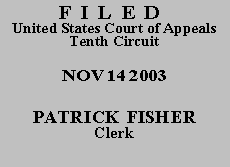

| MICHAEL P. VESCO,
Plaintiff, v. PAT SNEDECKER, Chief of Security, LCCF; JOE WILLIAMS, Chief Warden, LCCF; WACKENHUT CORRECTIONS CORPORATION; NEW MEXICO DEPARTMENT OF CORRECTIONS; ROBERT PERRY, Secretary of Corrections; JOHN SHANKS, Director of Adult Prisons; MICHAEL SOLIZ, Captain, LCCF; SHANNON MANNING, Sgt., LCCF; LEA COUNTY, NM; LAWRENCE TAFOYA, Warden, SNMCF; LUPE MARSHALL, Associate Warden, SNMCF; KATHLEEN HODGES, Mental Health Svcs. Dir., SNMCF, Defendants-Appellees, PAUL LIVINGSTON, Attorney-Appellant. |
|
Appellant Paul Livingston, an attorney at law representing himself on appeal, challenges the district court's order denying his motion for sanctions and attorney fees. He also appeals the order denying reconsideration. The only defendants-appellees involved in this appeal are employees, officials, or agencies of the State of New Mexico; they will be referred to as "the State defendants." Because Mr. Livingston lacks standing to bring this appeal, the appeal is dismissed.
Mr. Livingston represented plaintiff Michael Vesco in the underlying case wherein Mr. Vesco, an inmate, alleged that his civil rights were violated by prison personnel. During the course of those proceedings, Mr. Vesco informed the trial court, some of the defendants, and Mr. Livingston that he wanted Mr. Livingston to cease representing him. At one point, Mr. Vesco relented and consented to have Mr. Livingston represent him at some of the proceedings. The record is unclear as to what and when those proceedings were. Nevertheless, Mr. Vesco again requested Mr. Livingston to withdraw, but Mr. Livingston refused to do so until alternate counsel was appointed for Mr. Vesco. Aplee. Supp. App., Vol. II at 488-89. The State defendants filed motions to dismiss and for summary judgment seeking to dispose of all of Mr. Vesco's claims. The State defendants served copies of all motions on Mr. Livingston, but not on Mr. Vesco. Neither Mr. Vesco nor Mr. Livingston responded to the motions. The district court dismissed the case by granting the motion to dismiss for failure to exhaust administrative remedies. Id. at 494.
Mr. Livingston then filed a motion under Rule 11 of the Federal Rules of Civil Procedure requesting an "award of sanctions, including attorney's fees, for the cost, expense, and damage caused by [the State] Defendants' abusive filing of unnecessary, burdensome, and vexatious motions and memoranda." Aplt. App. at 8. Mr. Livingston claimed that the State defendants' motions to dismiss and for summary judgment should have been served on Mr. Vesco and that the sheer number and complexity of those motions was unnecessarily burdensome.
The State defendants then filed their motion for fees and costs to be assessed against Mr. Livingston. The district court held a hearing on June 4, 2002. At its conclusion, the court imposed sanctions against Mr. Livingston in the form of attorney fees and expenses incurred by the State defendants. Vesco v. Snedecker, 236 F. Supp. 2d 1272, 1278 (D.N.M. 2002), appeal dismissed (10th Cir. Nov. 4, 2002). The district court denied Mr. Livingston's Rule 11 motion and his motion to reconsider. He appeals both orders.
The State defendants challenge Mr. Livingston's standing to appeal. Standing is a jurisdictional issue. Vt. Agency of Natural Res. v. United States ex rel. Stevens, 529 U.S. 765, 771 (2000). An attorney has standing to appeal orders that directly affect him, but he does not have standing to appeal orders that affect only his client. Weeks v. Indep. Sch. Dist. No. I-89, 230 F.3d 1201, 1213 (10th Cir. 2000).
Mr. Livingston's Rule 11 motion sought attorney fees to be paid to him, and sanctions to be imposed against the attorneys representing the State defendants. "An order awarding or denying attorney fees is an order applicable to the client, not the client's counsel." Id. Therefore, Mr. Livingston does not have standing to challenge the order denying the request for attorney fees. See id.
We also hold that Mr. Livingston lacks standing to challenge the order denying sanctions. Generally, an attorney does not have standing to bring a Rule 11 motion on his own behalf (as opposed to on behalf of his client-party). See N.Y. News, Inc. v. Kheel, 972 F.2d 482, 486 (2d Cir. 1992) (rejecting non-party's request to intervene seeking to protect judicial process against abuse); see also Nyer v. Winterthur Int'l, 290 F.3d 456, 459 (1st Cir. 2002) (reciting general rule that non-party may not bring Rule 11 motion for sanctions; collecting cases); Westlake N. Prop. Owners Ass'n v. City of Thousand Oaks, 915 F.2d 1301, 1307 (9th Cir. 1990) (holding attorney for party cannot bring Rule 11 motion for sanctions on his own behalf).
APPEAL DISMISSED.
Entered for the Court
Circuit Judge
*. This order and judgment is not binding precedent, except under the doctrines of law of the case, res judicata, and collateral estoppel. The court generally disfavors the citation of orders and judgments; nevertheless, an order and judgment may be cited under the terms and conditions of 10th Cir. R. 36.3.